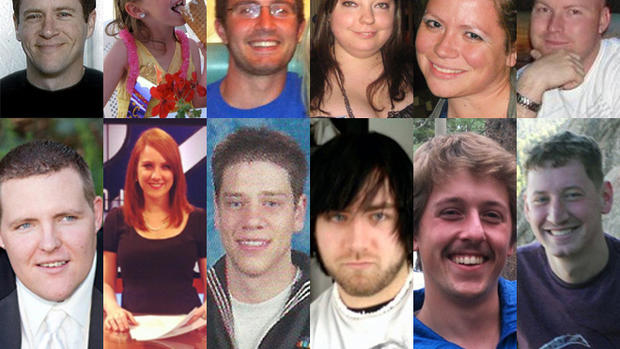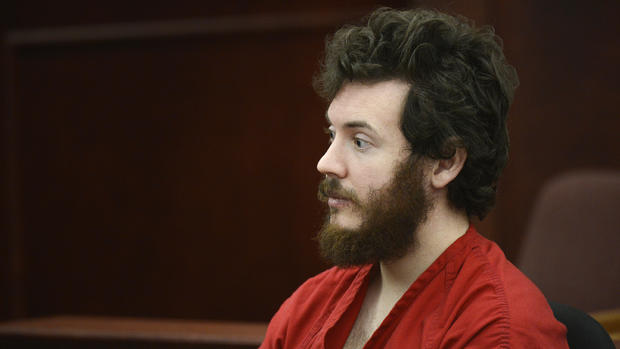FBI: Booby trap at Holmes' Aurora home had napalm
Updated at 7:56 p.m. ET
CENTENNIAL, Colo. An elaborate booby trap system allegedly set up to pull police away from the Colorado theater shooting included improvised napalm and thermite, which burns so hot that water can't put out the blaze.
FBI bomb technician Garrett Gumbinner described the system Tuesday at a hearing in which prosecutors laid out their case against suspected gunman James Holmes.
He said three different ignition systems were found in Holmes' apartment. There was a thermos full of glycerin leaning over a skillet full of another chemical. Flames and sparks are created when they mix, and a trip wire linked the thermos to the door.
Police said Holmes hoped a boom box on a timer would lure someone to the apartment.
Prosecutors are trying to show in what is expected to be a weeklong hearing that the attack that killed 12 and wounded dozens July 20 was a premeditated act and that Holmes should stand trial.
Defense attorneys say he is mentally ill.
Daniel King, one of Holmes' lawyers, on Monday pointedly asked a pathologist who had just detailed each of the fatalities: "You're aware that people can be found not guilty on the grounds of insanity?"
Chantel Blunk, whose husband, Jonathan Blunk, died in the attack, doubted that Holmes was mentally ill.
"He's in shock of what he's done, but I don't think he's mentally ill," Blunk told reporters Tuesday outside the courthouse. "You had all that time to plan it, write it, talk about it, no, you're not mentally ill."
When officers arrived at the theater, they found Holmes standing next to his car. At first, Officer Jason Oviatt said, he thought Holmes was a policeman because of how he was dressed but then realized he was just standing there and not rushing toward the theater.
Oviatt said Holmes seemed "very, very relaxed" and didn't seem to have "normal emotional reactions" to things. "He seemed very detached," he said.
At one point, after arresting Holmes, Officer Justin Grizzle asked him if anyone had been helping him or working with him. "He just looked at me and smiled ... like a smirk," Grizzle recalled.
So far, the hearing has focused on the horror Aurora police officers discovered at the theater. The magnitude of the attack could be heard in the first 911 call to police, played Tuesday in court. It lasted 27 seconds and police say at least 30 shots could be heard.
The call came in 18 minutes into the showing of "The Dark Knight Rises."
Police also played a 911 call from a teenage cousin of 6-year-old Veronica Moser-Sullivan, the youngest person killed. A dispatcher tried to talk her through CPR but she sounded panicked and said she couldn't hear.
"My two cousins, they are sitting on the floor," 13-year-old Kaylan told the dispatcher, according to CBS correspondent Barry Petersen. "One of them is not breathing."
A bearded and disheveled Holmes stared straight ahead as the calls were played and didn't show any emotion.
Holmes also showed little emotion on Monday as police officers struggled to hold back tears during their testimony, reciting a litany of heartbreak: discovering Moser-Sullivan without a pulse, trying to keep a wounded man from jumping out of a moving police car to go back for his 7-year-old daughter, screaming at a gunshot victim not to die.
"After I saw what I saw in the theater — horrific — I didn't want anyone else to die," Grizzle said.
Holmes watched intently as one detective showed a surveillance video of him calmly entering the theater lobby, holding the door open for a couple behind him, and printing out tickets to the midnight showing of "The Dark Knight Rises" that he purchased electronically nearly two weeks earlier. Authorities did not show a video of the attack but say Holmes, wearing body armor, tossed two gas canisters into the packed theater, then opened fire.
The hearing will be the best opportunity yet for survivors to find out about Holmes' mental state and the sequence of events that led up to the attack. It comes weeks after a shooting at a Newtown, Conn., school killed 20 children and six adults and increased scrutiny on the combustible mix of firearms and mental illness.
Holmes is charged with more than 160 counts, including murder and attempted murder. The hearing will allow the judge to determine whether the prosecution's case is strong enough to warrant a trial, but it's rare for a judge not to order a trial if a case gets this far.
During the hearing, the defense called Holmes a "severely mentally ill" person, a strong suggestion they will use a defense of insanity, Petersen reports.
Legal analysts say that evidence appears to be so strong that Holmes may well accept a plea agreement before trial.
While prosecutors have yet to decide on whether they will seek the death penalty, such a plea could get Holmes a lesser sentence, such as life in prison; help the state avoid a costly trial; and spare survivors and families of those who died from the trauma of going through a lengthy trial.

